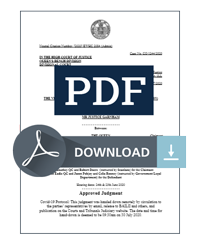WhatsApp as a Means of Giving Evidence in Criminal Trials
By Fahrid Chishty
WhatsApp as a Means of Giving Evidence in Criminal Trials
As the curtain falls on the pandemic, the Court of Appeal has issued guidance on the future use of technology in criminal trials.
In Abdul Kadir v R [2022] EWCA Crim 1244, the Court rejected submissions by an Appellant that his convictions in the Crown Court were unsafe where the trial judge had refused his application to call evidence from his half-brother in Bangladesh via WhatsApp.
Although the Court refused the application, it did shed light on the question whether judicial orders for live links for witnesses may extend to the use of WhatsApp or are restricted to the more conventional Cloud Video Platform (CVP) or Microsoft Teams operating systems.
Delivering the Court’s judgment, Lord Justice Holroyde held that evidence may permissibly be given by witnesses via WhatsApp in the interests of justice. This is the case under both the temporary provisions that were in force during the pandemic (when the Appellant was tried) and the provisions as they now stand under the expanded regime imported by the Police, Crime, Sentencing and Courts Act 2022 (“PCSCA”).
Background
Abdul Kadir was charged with ten counts of rape, attempted and indecent assault in May 2019. He was tried at Snaresbrook Crown Court in May 2021. During his trial, he applied to adduce evidence from his half-brother, Sarmad, living in Bangladesh. It was anticipated that Sarmad would give evidence via CVP. The trial judge granted the application, but CVP proved impracticable and a satisfactory connection with the witness could not be secured. As such, an application was made for him to give evidence by way of WhatsApp. The judge refused the application on the basis that she had carried out her own enquires and formed the view that it would not be a safe and secure method for receiving evidence.
Mr Kadir was ultimately convicted and sentenced to a special custodial sentence of 18 years, comprising a custodial term of 17 years and an extension period of 1 year. He appealed against conviction, submitting that the trial judge had erred in refusing the application for Sarmad’s evidence to be given via WhatsApp. In so doing, she had impeded his ability to fully challenge the complainants’ evidence and obscured a full picture of the facts from the jury.
The law on Live Links
During the pandemic, the criminal justice system was confronted with the need to accommodate a broader range of participants in criminal proceedings via remote means. As such, Section 51 of the Criminal Justice Act 2003 (“CJA”), which permitted witnesses to attend court via live links as a matter of judicial discretion, was temporarily amended to include a broader class of persons within its remit. Significantly, defendants were not excluded. The amendment appears to have served its purpose in keeping the criminal courts’ functioning during periods of lockdown and social distancing.
Now that the pandemic has begun to subside and the world is steadily “learning to live with Covid”, many temporary measures, including the provisions governing grants of live links to participants in criminal proceedings, have been given a permanent footing. Section 200 of the PCSCA, which entered into force on the 22nd June 2022, is the source of the ‘new regime’. It not only amended Section 51 to make permanent the power to grant live links to a broader range of persons; it also introduced new powers altogether, such as the power to grant live links to juries in limited circumstances. Importantly, the new regime is supplemented by definitive statutory guidance from the Lord Chief Justice, which neatly summarises the latest framework.[1]
Decision
Given that Mr Kadir’s trial took place during 2020, when the previous ‘temporary regime’ was in full flow, the Court of Appeal’s judgment focusses its analysis on the law as it applied at that time. As such, Holroyde LJ begins the judgment with a helpful overview of the position. It can be distilled as follows.
Essentially, during ‘Covid times’, Section 51 CJA provided that a person could take part in criminal proceedings through the use of “a live video link”.[2] According to Section 56(2D) of the same Act, “a live video link” meant a live television link or “other arrangement” that enables the participant to see and hear all other persons participating in proceedings and vice versa. Moreover, Holroyde LJ reminds the parties that all criminal tribunals have duty to carry out active case management under the Criminal Procedure Rules 2020 (“CrimPR”) which includes making use of technology. This extends to granting “appropriate live links”, irrespective of whether the parties have made express applications to that effect.[3] As to what constitutes an “appropriate live link”, the Criminal Practice Directions 2020 (“CPD”) provide that it:
“is not a term of art. It has the ordinary English meaning of ‘fitting’ or ‘suitable’ […] What degree of protection from accidental or deliberate interception should be considered appropriate will depend upon the purpose for which a live link or telephone is to be used. If it is to participate in a hearing which is open to the public anyway, then what is communicated by such means is by definition public and the use of links such as Skype or Facetime, which are not generally considered secure from interception, may not be objectionable…”[4]
Another dimension to the debate is the issue whether a witness who is based overseas is permitted under the laws of that jurisdiction to give evidence in connection with criminal proceedings in England and Wales without obtaining prior permission. In fact, many countries require an International Letter of Assistance (ILOR) before deciding whether to grant their nationals permission to participate in proceedings. In this respect, regard should be had to the principles set out in Agbabiaka (evidence from abroad; Nare guidance) [2021] UKUT 00286 (IAC), which usher practitioners to seek clarity from the Taking of Evidence Unit within Foreign, Commonwealth & Development Office (FCDO) as to whether there are diplomatic objections associated with calling remote evidence from witnesses in other jurisdictions.
Turning to the Appellant’s grounds of appeal, the Court roundly rejected the submission that the trial judge had wrongly refused the application for evidence to be given by way of WhatsApp. This was primarily because Section 6C of the Criminal Procedure and Investigations Act 1996 (“Notification of Intention to call Defence Witnesses”) had not been properly complied with by the Defence. In effect, no written notice of the proposed witness had been given at any stage. His name was introduced into proceedings mid-way through the trial, and the Court and Crown therefore had limited means of checking the adequacy of the proposed arrangements or to consider suitable alternatives. However, as to the question whether WhatsApp would be suitable for receiving his evidence had Section C otherwise been properly complied with, the Court determined that it would. At paragraph 39 of the judgment, Holroyde LJ states in no unclear terms:
“WhatsApp was capable of being an “other arrangement” which could meet the definition of a live video link in s56(2D) of CJA 2003. Given that it uses end-to-end encryption, it was capable of being regarded as sufficiently secure for use, in particular in the context of giving evidence in open court.”
As such, it is now established law that live links in criminal proceedings extend to WhatsApp video-calling – providing it is in the interests of justice and the ordinary statutory requirements for a grant of live links are met.
Implications
The decision will come as welcome news to practitioners and defendants wishing to introduce evidence into proceedings from witnesses central to their cases. As experience has shown, CVP, Skype and Microsoft Teams can be impracticable and difficult to operate at times. WhatsApp, on the other hand, is user-friendly, more widely accessible and therefore potentially conducive to better quality communications.
However, it is important not to jump the gun. We would be mistaken if we thought that WhatsApp will be the primary mode of giving evidence for witnesses not present at court going forward. In its decision, the Court made plain that judges should endeavour to decide which ‘tech’ to grant in furtherance of a live links order on a case-by-case basis. Care should be exercised to ensure that the choice of software or application is granted in view of the overall circumstances of the case. See the dicta of Holroyde LJ at paragraph 39:
“We would add that a judge in similar circumstances today would similarly have the power to direct a live link via WhatsApp under the statutory provisions which are now in force, though it would of course be for the judge concerned to make a fact-specific decision in the circumstances of the particular case.”
It is important to bear in mind that the use of WhatsApp may also pose novel difficulties in respect of witnesses who give evidence remotely. This is primarily because WhatsApp is operated mainly, albeit not exclusively, from a mobile phone device. As such, there is a risk that witnesses may be susceptible to a degree of pressure or coaching that is not apparent to those sat at the other end of the link in the courtroom in England. This could be, for example, through receiving text messages whilst using the device or having a persuasive family member positioned out of sight. By the same token, witnesses could screenshot or record proceedings in breach of judicial warnings to the contrary. This risk may be particularly acute where witnesses experience English language difficulties and are unaccustomed to the rules regulating criminal proceedings in this jurisdiction. Moreover, where contempt is committed in this manner, it is highly unlikely that sanctions could realistically be imposed on an offending witness. As such, Courts will inevitably tread very carefully when deliberating whether to grant applications to give evidence via WhatsApp. Whilst it is a potentially very valuable tool, practitioners and judges should be satisfied that the risks set out above can be obviated.
The other outstanding question is whether this latest decision opens the door for other social media platforms to make a debut in English courtrooms. Although WhatsApp has a global user base, some countries prohibit use of the application altogether or promote the use of local alternatives. In addition, some witnesses may prefer Facebook Messenger, Instagram or Zoom video-calling due to interface or accessibility issues. Whilst it is tempting to see Abdul Kadir v R as authority for the proposition that live links should now extend to all social media applications providing video-calling facilities, it should be remembered that the pendulum swung in favour of WhatsApp on this occasion in great part due to its end-to-end encryption. As such, it should not be assumed that the decision has paved the way for other applications to be used where to do so would meet the interests of justice. In reality, it remains early days and the parameters of the new regime governing the use of live links in criminal litigation in the post-Covid era are still to be tested.
Finally, participants in criminal trials should be alive to the (general) possibility that calling evidence from overseas may offend the domestic laws or diplomatic sensibilities of other jurisdictions. In these circumstances, Courts and practitioners should bear in mind that a decision to grant live links may impinge upon the UK’s international relations. Where this is the case, a question plainly arises as to whether the public interest is still being served. Certain jurisdictions will naturally operate more stringent restrictions than others, and these are nuances that will need to be factored into any applications to call evidence from overseas. Evidently, the power to grant live links in the context of overseas witnesses will engage a discrete set of questions which judges and practitioners will need to navigate sensitively, bearing in mind the ‘bigger picture’. Whilst live links – and now WhatsApp – are here to stay, it is clear that the regime governing their use may continue to evolve in scope and complexity.
Fahrid Chishty, 25th September 2022
[1] See https://www.judiciary.uk/wp-content/uploads/2022/07/Live-links-Guidance-for-criminal-courts-July-2022.pdf
[2] See Section 51(1)(b) of the Act
[3] See r3.2(4) CrimPR
[4] See Part 3N.4, CPD


